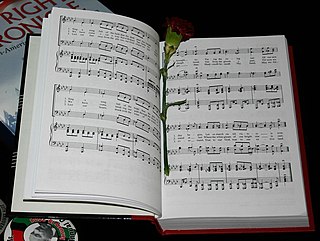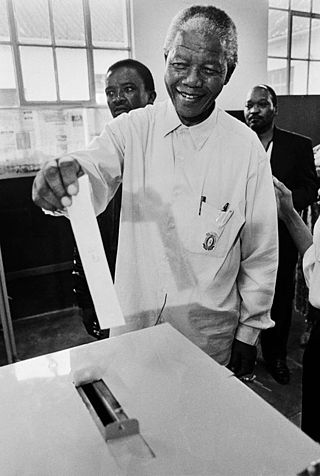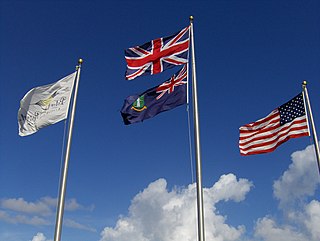Related Research Articles

The Pledge of Allegiance is a patriotic recited verse that promises allegiance to the flag of the United States and the republic of the United States of America. The first version, with a text different from the one used at present, was written in 1885 by Captain George Thatcher Balch, a Union Army officer in the Civil War who later authored a book on how to teach patriotism to children in public schools. In 1892, Francis Bellamy revised Balch's verse as part of a magazine promotion surrounding the World's Columbian Exposition, which celebrated the 400th anniversary of Christopher Columbus' arrival in the Americas. Bellamy, the circulation manager for The Youth's Companion magazine, helped persuade then-president Benjamin Harrison to institute Columbus Day as a national holiday and lobbied Congress for a national school celebration of the day. The magazine sent leaflets containing part of Bellamy's Pledge of Allegiance to schools across the country and on October 21, 1892, over 10,000 children recited the verse together.
West Virginia State Board of Education v. Barnette, 319 U.S. 624 (1943), is a landmark decision by the United States Supreme Court holding that the First Amendment protects students from being compelled to salute the American flag or say the Pledge of Allegiance in public schools.

"Lift Every Voice and Sing" is a hymn with lyrics by James Weldon Johnson (1871–1938) and set to music by his brother, J. Rosamond Johnson (1873–1954). Written from the context of African Americans in the late 19th century, the hymn is a prayer of thanksgiving to God as well as a prayer for faithfulness and freedom, with imagery that evokes the biblical Exodus from slavery to the freedom of the "promised land."

The Freedom Charter was the statement of core principles of the South African Congress Alliance, which consisted of the African National Congress (ANC) and its allies: the South African Indian Congress, the South African Congress of Democrats and the Coloured People's Congress. It is characterised by its opening demand, "The People Shall Govern!"
In United States law, the Establishment Clause of the First Amendment to the United States Constitution, together with that Amendment's Free Exercise Clause, form the constitutional right of freedom of religion. The relevant constitutional text is:
Congress shall make no law respecting an establishment of religion...

The Constitutional Court of South Africa is a supreme constitutional court established by the Constitution of South Africa, and is the apex court in the South African judicial system, with general jurisdiction.

Freedom Day is a public holiday in South Africa celebrated on 27 April. It commemorates the first post-apartheid elections held on that day in 1994 and the day on which the new constitution was introduced. The elections were the first national elections where everyone of voting age of over 18 from any race group, was allowed to vote.

A referendum on becoming a republic was held in South Africa on 5 October 1960. The Afrikaner-dominated right-wing National Party, which had come to power in 1948, was avowedly republican and regarded the position of Queen Elizabeth II as the South African monarch as a relic of British imperialism. The National Party government subsequently organised the referendum on whether the then Union of South Africa should become a republic. The vote, which was restricted to whites—the first such national election in the union—was narrowly approved by 52.29% of the voters. The Republic of South Africa was constituted on 31 May 1961.

The Constitution of Bangladesh, officially the Constitution of the People's Republic of Bangladesh is the supreme law of Bangladesh. The document provides the framework that demarcates the Bangladeshi republic with a unitary, parliamentary democracy, that enshrines fundamental human rights and freedoms, an independent judiciary, democratic local government and a national bureaucracy.
The Oath of Citizenship, or Citizenship Oath, is a statement recited and signed by those who apply to become citizens of Canada. Administered at a ceremony presided over by a designated official, the oath is a promise or declaration of fealty to the Canadian monarch and a promise to abide by Canada's laws and uphold the duties of a Canadian citizen; upon signing the oath, citizenship is granted to the applicant.

A truth commission, also known as a truth and reconciliation commission or truth and justice commission, is an official body tasked with discovering and revealing past wrongdoing by a government, in the hope of resolving conflict left over from the past. Truth commissions are, under various names, occasionally set up by states emerging from periods of internal unrest, civil war, or dictatorship marked by human rights abuses. In both their truth-seeking and reconciling functions, truth commissions have political implications: they "constantly make choices when they define such basic objectives as truth, reconciliation, justice, memory, reparation, and recognition, and decide how these objectives should be met and whose needs should be served".

Albert "Albie" Louis Sachs is a South African lawyer, activist, writer, and former judge appointed to the first Constitutional Court of South Africa by Nelson Mandela.
The Pledge of Allegiance of the United States has been criticized on several grounds. Its use in government funded schools has been the most controversial, as critics contend that a government-sanctioned endorsement of religion violates the Establishment Clause of the First Amendment to the U.S. Constitution. Arguments against the pledge include that the pledge itself is incompatible with democracy and freedom, that it is a form of nationalistic indoctrination, that pledges of allegiance are features of current and former totalitarian states such as Nazi Germany, and that the pledge was written to sell flags.
Chapter Two of the Constitution of South Africa contains the Bill of Rights, a human rights charter that protects the civil, political and socio-economic rights of all people in South Africa. The rights in the Bill apply to all law, including the common law, and bind all branches of the government, including the national executive, Parliament, the judiciary, provincial governments, and municipal councils. Some provisions, such as those prohibiting unfair discrimination, also apply to the actions of private persons.

The Constitution of Benin was adopted by referendum on 23 December 1956. The constitution is made up of a preamble, twelve titles, and 160 articles.

Robert F. Kennedy's Day of Affirmation Address is a speech given to National Union of South African Students members at the University of Cape Town, South Africa, on June 6, 1966, on the University's "Day of Reaffirmation of Academic and Human Freedom". Kennedy was at the time the junior U.S. senator from New York. His overall trip brought much attention to Africa as a whole.

The Constitution of Namibia is the supreme law of the Republic of Namibia. Adopted on 9 February 1990, a month prior to Namibia's independence from apartheid South Africa, it was written by an elected constituent assembly.
The South African Charter of Religious Rights and Freedoms (SACRRF) is a charter of rights drawn up by South African religious and civil organisations which is intended to define the religious freedoms, rights and responsibilities of South African citizens. The aim of the drafters of the charter is for it to be approved by Parliament in terms of section 234 of the Constitution of South Africa.
South Africa is a secular state, with freedom of religion enshrined in the Constitution.

The Virgin Islands pledge is a pledge of allegiance to the Virgin Islands, a British overseas territory. It was officially adopted by the territory's House of Assembly on 23 June 2016. It's intended to be commonly recited by Virgin Islanders in unison at public events, especially in schools, and during public celebrations. The pledge was first publicly recited on 1 July 2016 at Territory Day celebrations by Premier Orlando Smith and members of the government. The pledge reads:
I pledge to my country, the Territory of the Virgin Islands, to encourage national pride and dignity, render patriotic service, promote justice for all, be true to God and remain dedicated to these Virgin Islands.
References
- ↑ "Learners could be reciting pledge by March". Bua News. Retrieved 5 July 2008.[ dead link ]
- ↑ "SA battles national identity crisis". Mail&Guardian Online. Retrieved 5 July 2008.